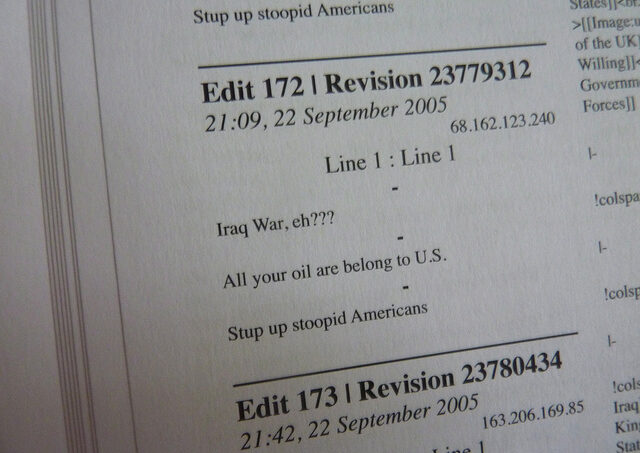
Image from "The Iraq War: A Historiography of Wikipedia Changelogs," a twelve-volume set of all changes to the Wikipedia article on the Iraq War (totalling over 12,000 changes and almost 7,000 pages), by STML.
Ed: I really like the way that, contrary to many current studies on conflict and Wikipedia, you focus on how conflict can actually be quite productive. How did this insight emerge? Kim: I was initially looking for instances of collaboration in Wikipedia to see how popular debates about peer production played out in reality. What I found was that conflict was significantly more prevalent than I had assumed. It struck me as interesting, as most of the popular debates at the time framed conflict as hindering the collaborative editorial process. After several stages of coding, I found that the conversations that involved even a minor degree of conflict were fascinating. A pattern emerged where disagreements about the editorial process resulted in community members taking positive actions to solve the discord and achieve consensus. This was especially prominent in early discussions prior to 2005 before many of the policies that regulate content production in the encyclopaedia were formulated. The more that differing points of view and differing evaluative frames came into contact, the more the community worked together to generate rules and norms to regulate and improve the production of articles. Ed: You use David Stark’s concept of generative friction to describe how conflict is ‘central to the editorial processes of Wikipedia’. Can you explain why this is important? Kim: Having different points of view come into contact is the premise of Wikipedia’s collaborative editing model. When these views meet, Stark maintains there is an overlap of individuals’ evaluative frames, or worldviews, and it is in this overlap that creative solutions to problems can occur. People come across solutions they may not otherwise have encountered in the typical homogeneous, hierarchical system that is traditionally the standard for institutions trying to maximise efficiency. In this respect, conflict is central to the process as it is about the struggle to negotiate meaning and achieve a consensus among editors with differing opinions and perspectives.…
